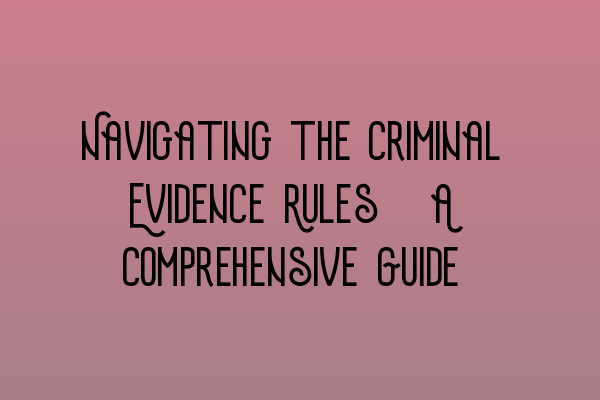Navigating the Criminal Evidence Rules: A Comprehensive Guide
Welcome to SQE Criminal Law & Practice Law UK, your trusted source for expert legal advice and guidance. In this comprehensive guide, we will delve into the intricate world of criminal evidence rules and provide you with invaluable insights to navigate this complex landscape. Whether you’re a law student preparing for the SQE exams or a seasoned legal professional looking for a refresher, this guide has got you covered.
Understanding the Basics: What are Criminal Evidence Rules?
Criminal evidence rules are a set of guidelines and principles that govern the admissibility and use of evidence in criminal proceedings. These rules ensure fairness and protect the rights of defendants, prosecutors, and the overall integrity of the justice system. It is crucial for legal professionals to have a thorough understanding of these rules to effectively represent their clients and present their case in court.
Key Components of Criminal Evidence Rules
Before we dive into the intricacies, let’s take a moment to familiarize ourselves with the key components of criminal evidence rules:
1. Relevance
Relevance is a fundamental principle in criminal evidence rules. Evidence must be directly related to the issues in dispute and have probative value. It is important to understand how to assess and establish relevancy in a criminal case, as it can significantly impact the outcome.
2. Hearsay
Hearsay refers to an out-of-court statement offered for the truth of the matter asserted. It is generally considered inadmissible unless it falls within an exception. Familiarizing yourself with the various exceptions to the hearsay rule is essential to effectively present or challenge evidence.
3. Expert Opinion
Expert opinion evidence plays a crucial role in criminal proceedings. Understanding when and how to introduce expert opinions, as well as the qualifications required for an expert witness, is vital for building a strong case.
4. Character Evidence
Character evidence refers to evidence of a person’s character or disposition. It is often subject to specific rules, such as the character evidence rule, which limits its admissibility. Knowing when and how to use character evidence can be a strategic advantage in a criminal trial.
Practical Considerations and Challenges
Navigating the criminal evidence rules can be challenging, especially when dealing with complex cases or evolving legal precedents. Here are some practical considerations to keep in mind:
1. Case Preparation
Thorough case preparation is essential for success in criminal proceedings. Familiarize yourself with the evidence and the rules that apply to it. Use our SQE 1 Practice Exam Questions to enhance your knowledge and test your understanding.
2. Admissibility Challenges
Challenging the admissibility of evidence requires a comprehensive understanding of the relevant rules. Stay updated with recent case law and precedents to effectively challenge evidence that may be inadmissible. Our SQE 1 Practice Mocks FLK1 FLK2 will help you practice identifying and addressing admissibility challenges.
3. Evidence Presentation
Presenting evidence effectively is a critical skill for any legal professional. Know how to structure your arguments, present exhibits, and cross-examine witnesses. Our SQE 2 Preparation Courses provide comprehensive guidance on evidence presentation techniques.
4. Stay Updated with the Latest Rules
Criminal evidence rules are dynamic and subject to change. Stay updated with the latest developments, amendments, and statutory provisions. Our SQE 1 Preparation Courses offer comprehensive coverage of the latest rules and regulations.
Important Dates: SQE Exam Schedule
Mark your calendars with the important dates for the SRA SQE exams. Being aware of the exam schedule is crucial for effective preparation. Visit our SRA SQE Exam Dates page to stay updated on the exam dates and registration deadlines.
Conclusion
Navigating the criminal evidence rules is no easy task, but with a comprehensive understanding of the key principles and practical considerations, you can confidently handle any criminal case. Make use of the resources and expertise available at SQE Criminal Law & Practice Law UK to enhance your knowledge and stay ahead in your legal career.
